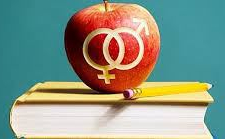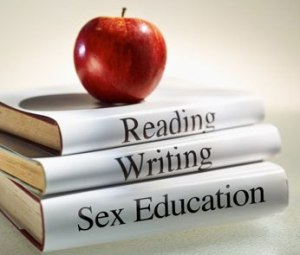“Let’s talk about sex, for now, To the people at home or in the crowd, It keeps coming up anyhow, Don’t decoy, avoid, or make void the topic, Cause that ain’t gonna stop it!” These lyrics from the 1990 Salt-N-Pepa hit have never been more apt. The hit-and-miss manner in which sexual education is addressed in South-African schools has reached its tipping-point.
 Women are victims. Men are only predators. Sex is shameful and damaging. Only heterosexuality is acceptable. Gender is a black and white issue. These norms are what many learners are taking away from sexual education classes, that’s if they’re actually paying attention and not giggling about awkward images in textbooks.What masquerades as sexual education in South Africa is in actual fact not education at all. Many young South Africans are left with inadequate teaching about sexuality, gender and sex and are then vulnerable to abuse, exploitation, unwanted pregnancies or sexually transmitted diseases.
Women are victims. Men are only predators. Sex is shameful and damaging. Only heterosexuality is acceptable. Gender is a black and white issue. These norms are what many learners are taking away from sexual education classes, that’s if they’re actually paying attention and not giggling about awkward images in textbooks.What masquerades as sexual education in South Africa is in actual fact not education at all. Many young South Africans are left with inadequate teaching about sexuality, gender and sex and are then vulnerable to abuse, exploitation, unwanted pregnancies or sexually transmitted diseases.
Derika de Villiers, clinical psychologist and member of the organisation Action Breaks Silence (ABS), is of the opinion that sex education is an “interesting topic that can add value insight and empowerment to youngsters.” However, she argues that the way in which it is taught makes the subject taboo as it focuses on stereotypes, discrimination, guilt and shame often get attached to the topic. Juliet Houghton, director of Chiva Africa (a paediatric training organisation), argues that sexual education is crucial in developing years and should ideally come from a neutral source, such as a teacher, to ensure that learners are comfortable to speak freely without fear of judgement or awkwardness. Unfortunately, the curriculum has failed to do this and young South Africans have nowhere to turn to for information except for the internet which isn’t always the most trustworthy source.
Sexual education can influence your physical, emotional, social and cognitive well-being according to de Villiers. Sex education should be about sexual health and making choices which will be beneficial and empower young South Africans with knowledge. However, in many schools the topic of sexual education is never covered while others address topics such as reproduction, pregnancy and Aids prevention, but very briefly and lack skill-based instruction. Scott Burnett, the director of loveLife, suggests that the biggest hurdle for quality sexual education is teachers from an older generation who are uncomfortable with the subject matter.
 Many teenagers are uncomfortable when it comes to talking about sex because in classrooms there is a moral slant to this issue. Issues around sex, gender and sexuality are made out to be awkward instead of completely natural. These issues are often given the same treatment at home. Many parents are apprehensive around conversations about sexuality or sex because they believe that this will encourage them to have sex. However, this does not necessarily ensure abstinence but instead, opens the playing field for unsafe sex or other dangerous situations. Thereby sex and sexuality have become something terrifying which leads to disgrace, tragedy and social rejection.
Many teenagers are uncomfortable when it comes to talking about sex because in classrooms there is a moral slant to this issue. Issues around sex, gender and sexuality are made out to be awkward instead of completely natural. These issues are often given the same treatment at home. Many parents are apprehensive around conversations about sexuality or sex because they believe that this will encourage them to have sex. However, this does not necessarily ensure abstinence but instead, opens the playing field for unsafe sex or other dangerous situations. Thereby sex and sexuality have become something terrifying which leads to disgrace, tragedy and social rejection.
The Alan Guttmacher Institute has identified that preaching celibacy isn’t necessarily effective because thereby students are refused crucial information necessary when they do decide to become sexually active. Teenagers lack the guidance to equip them with knowledge and skills on how to make informed decisions on when, how and under which circumstances or relationships they want to have sex. De Villiers suggest that “real issues” need to receive more attention; sexual abuse and victimisation, gender inequality and stereotypes that lead to gender-based violence, sexual orientation also needs to be addressed as well as practical matters at younger ages. De Villiers mentioned for example, “Girls need to know what to do if they don’t have hygiene pads and the consequences thereof.”
Previously the threat of unwanted pregnancies and STD’s were the main reasons given to why teenagers should receive sexual education, the benefits, however, are much more intriguing. Sexual education could result in respect and empathy crossing the boundaries of gender or sex. De Villiers suggests that there is a definite link between the lack of sexual education and sexual violence in South Africa.
 South Africa’s sexual violence rates are among the highest in the world. Sexual violence refers to the use of force or manipulation to get someone to engage in an unwanted sexual activity. Research suggests that perhaps sexual education could decrease instances of sexual violence in South Africa.
South Africa’s sexual violence rates are among the highest in the world. Sexual violence refers to the use of force or manipulation to get someone to engage in an unwanted sexual activity. Research suggests that perhaps sexual education could decrease instances of sexual violence in South Africa.
De Villiers has found that, through her work with ABS, young South Africans between the ages of 9 and 15 are in dire need of sexual education. “(These youngsters) hold very strong gender stereotypes, taught by their seniors, which gives them the ‘right’ to abuse and victimise the opposite gender, based on beliefs they have internalised.” De Villiers indicated that if someone doesn’t intervene these teens will do what they are told or what they’ve experienced through exposure to violence. “This has become a generational issue that needs to break as soon as possible!”
The idea that young people shouldn’t be taught about safe sex, sexuality and gender differences because that might encourage them to start acting promiscuously, is equivalent to an argument that teaching people about airbags will make them think it’s acceptable to start crashing into things. The taboo around sexual education, guilt and shame should be squashed. Knowledge and empowerment need to take the main stage.

Very interessting
LikeLike